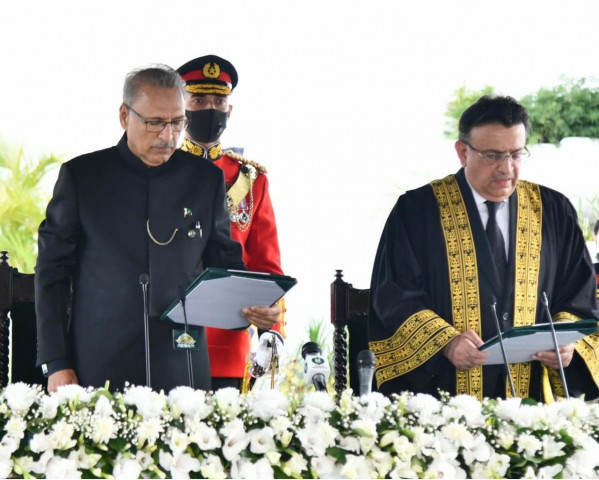Justice Bandial takes oath as 28th chief justice of Pakistan
He is the first non-PCO judge to become CJP in decades

Justice Umar Ata Bandial on Wednesday took oath as the 28th chief justice of Pakistan (CJP) at a ceremony at the Aiwan-e-Sadr, following the retirement of Justice Gulzar Ahmed.
President Dr Arif Alvi administered the oath; Prime Minister Imran Khan was also present at the ceremony.
LIVE #APPNews : President Dr. Arif Alvi administers oath to Justice Umar Ata Bandial as the Chief Justice of Pakistan #Islamabad @PresOfPakistan @ArifAlvi
— APP 🇵🇰 (@appcsocialmedia) February 2, 2022
https://t.co/QqZ6nQfATR
Justice Bandial is the first CJP to come in decades who did not take oath under the Provisional Constitutional Order (PCO).
Following his oath-taking ceremony, Chief Justice Bandial said that the burden of pending cases in the Supreme Court should be reduced and lawyers should come prepared for hearings to avoid adjournments.
Justice Bandial's journey
Justice Bandial received his law degree from the University of Cambridge in 1981 and was elevated to the rank of a judge of the Lahore High Court (LHC) in 2004.
Bandial had declined the oath under PCO in 2007 but was restored as a judge of the LHC during the Pakistan Peoples Party (PPP) regime through the Naek formula.
He served as the chief justice of the LHC for two years, after which he was elevated as a judge of the Supreme Court in June 2014.
During his career, Justice Bandial rendered judgments on several important public and private law issues. These included pronouncements on civil and commercial disputes, constitutional rights and public interest matters.
Read SC refuses to entertain plea against lifetime disqualification
According to renowned legal expert Reema Omer, CJ Bandial was part of the 21st Amendment judgment, which stated that the trial of civilians for terrorism by military courts did not violate the right to a fair trial or judicial independence.
He was also a signatory of the majority ruling authored by former judge Azmat Saeed Sheikh where salient features of the Constitution were given.
Justice Bandial himself had authored the judgment that declared disqualification under Article 62 (1) (f) – which stated that there must be a declaration from a Court of Law for declaring a candidate disqualified from being elected or chosen as a member of the parliament or the provincial assembly – is for life, and that Articles 62 and 63 reflect Islamic values and therefore are integral to scheme of the Constitution.
He was part of the bench that disqualified former prime minister Nawaz Sharif as the leader of Pakistan Muslim League-Nawaz (PML-N) and was also part of the bench that declared Pakistan Tehreek-e-Insaaf (PTI) chief Imran Khan as “Sadiq and Ameen”.
Read more Law ministry notifies Justice Bandial's appointment as next CJP
However, the same bench had disqualified PTI leader Jahangir Khan Tareen for life under Article 62 (1) (f) of Pakistan’s Constitution.
He was further part of the court which quashed the presidential reference against Justice Qazi Faez Isa and directed the Federal Board of Revenue (FBR) to conduct an inquiry regarding foreign properties of SC judge family members. However, his judgment was overturned by a majority of judges on April 26, 2021.
Justice Bandial also authored the order that suspended the Balochistan High Court (BHC) judgment on Defense Housing Authority (DHA) Quetta, wherein the BHC verdict had held that 6(1) (b) of the DHA Quetta Act, which allowed DHA Quetta to acquire land under the Land Acquisition Act, violated the Constitution.
In February last year, Justice Bandial set aside the Peshawar High Court (PHC) ruling that directed the National Accountability Bureau (NAB) to probe into alleged corruption in the Peshawar Bus Rapid Transit (BRT) project.
Reception by judiciary
Sharing his expectations of the CJP while talking to The Express Tribune, a senior lawyer on the basis of anonymity said that the new CJP will not engineer bench composition in high profile cases and “run the court, not the government” by exercising suo motu jurisdiction under Article 184 (3) of the Constitution.
Conversely, senior lawyers have expressed their apprehension with his first speech wherein he expressed his thoughts on exercising the suo motu jurisdiction during his tenure.
They claimed that parts of his speech reflected that he will resume the agenda, initiated by former CJP Mian Saqib Nisar, by exercising suo motu jurisdiction.
However, lawyers are convinced that during his tenure court workings will be improved.
Justice Bandial in his first speech suggested that all courts, including the apex court, should undergo performance audits to identify and remedy their weaknesses.
Also read Rifts emerge among Lahore lawyers over SCBA plea
Senior lawyers believe that a faction of the government is determined to initiate another move against Justice Qazi Faez Isa to prevent him from becoming the next CJP in September 2023. They maintained that if such an attempt was made, the role of Justice Bandial will be pivotal as his conduct will define his legacy.
Former Sindh High Court Bar Association president Salahuddin Ahmed said that the biggest challenge for the new CJP is to initiate urgent data-based analysis of the flaws and delays in the judicial system and implement reforms right down to the magistrate/civil judge level.
"Bring an end to all allegations of outside influences on the apex court by demonstrating its independence and unifying the court," he said.
He also suggested that CJP Bandial should combat the allegations of arbitrariness and favouritism by structuring and regulating the power of judicial appointments, suo motu as well as the fixation of rosters and cases.
Justice Bandial will work as the chief justice of Pakistan till September 2023.



















COMMENTS
Comments are moderated and generally will be posted if they are on-topic and not abusive.
For more information, please see our Comments FAQ